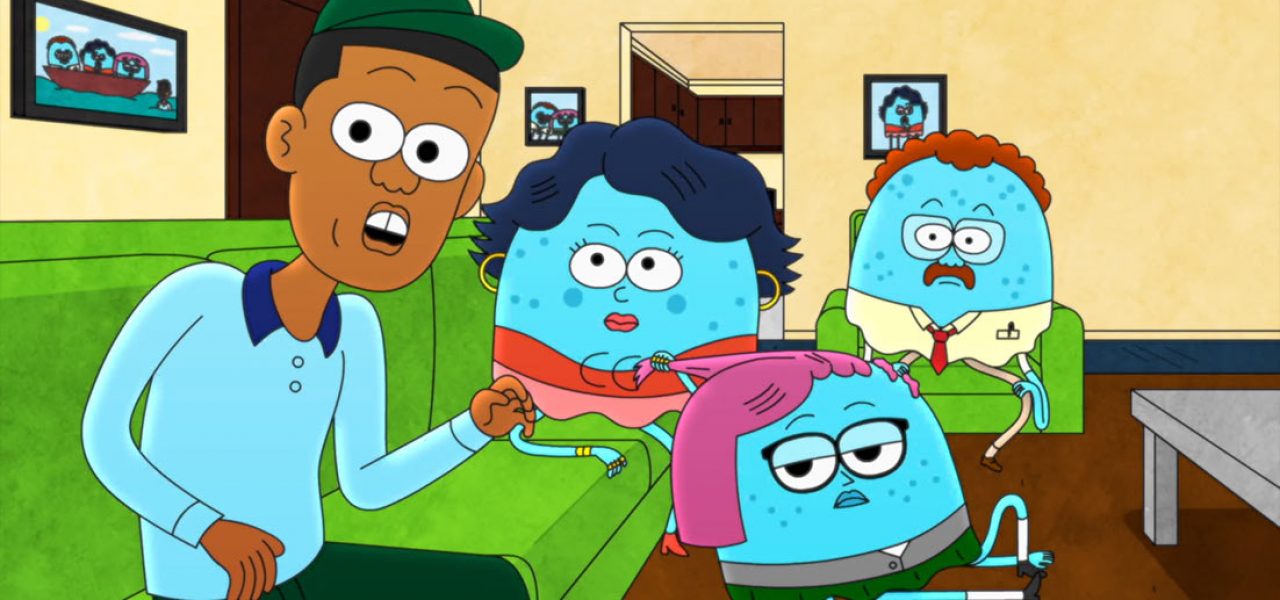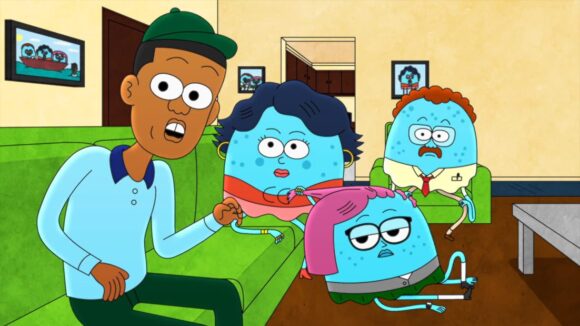

A Cartoon’s Cartoon: Phil LaMarr And Carl Jones On Adult Swim’s New Series ‘The Jellies’
Between The Boondocks, Samurai Jack, and other popular series, producer Carl Jones and actor Phil LaMarr have for years helped bring legendary animation to life. Just don’t call them legends.
“Whenever anybody says legends, I start to check my hips,” the prolific LaMarr, the voice of Samurai Jack himself, laughed by phone during a chat with Jones about The Jellies, Adult Swim’s new series adaptation of hip-hop artist Tyler The Creator’s webcartoon of the same name — though not the same complexion, as Jones curiously noted.
“The main character, Cornell, is black now,” explained Jones, who with comic strip creator Aaron McGruder adapted the woke newspaper comic, The Boondocks, into an acclaimed and controversial Peabody Award-winning animated series for Adult Swim. “In the original [Jellies], Cornell was white. And I’m not 100 percent sure why he was white in the first place.”
Jones describes The Jellies as an outright “cartoon’s cartoon” focused more intently on rolling jokes than social commentary. A 15-minute, late-night comedy about a teenager, voiced by LaMarr, undergoing an identity crisis after being adopted by anthropomorphic jellyfish, The Jellies and its jokes about sex, drugs, pop and (sometimes) politics won’t be mistaken for The Boondocks or even Black Dynamite’s more militantly self-conscious animation.
However, The Jellies, which premiered last Sunday, is indicative of our new cartoon universe, where programs of any complexion, with any concerns, can be created, distributed and given a chance to grow an audience, without fear of total erasure, which used to be the case, as LaMarr noted. I spoke with LaMarr and the self-professed Cartoon Brew fan Jones about the evolution of legendary and ephemeral cartoons, and why animation is entertainment’s most collaborative art form, even when it’s short on time and money.
Cartoon Brew: Carl, you’ve said that producing animation is like forcing a triangle into a circle.

Carl Jones: I’ve had experience growing up broke, trying to find ways to spend money that you don’t have — and that’s kind of what you’ve got to do with animation. You get a budget, and you get a schedule, and neither one of them agree with your vision for the show. So animation takes economic skills, to get what you want on the screen with limited resources. Granted, this is probably the case with any network, because animation is a tough medium. It has so many components. It starts with an idea that, once it is sent down the assembly line, you quickly realize didn’t have enough time or resources to be completely delivered. This has been the case with any show I’ve worked on, including The Jellies.
Phil LaMarr: From the performance standpoint, we’re only one component of that pipeline, and unfortunately we don’t get to interact that much with the other components. Sometimes, we get to see storyboards or some rough animation. But I’ll come in to record, and six months later come back in to [re-record] a line [for animation retakes], so there’s a lot that can go wrong and have to be fixed. You can go back to square one from any particular point.
But I also think animation is the single most collaborative part of show business, because there are so many people working together on it. Film is similar; someone dresses the set, someone creates the wardrobe. But in animation, there is one person drawing the wall, and another drawing the head. It sometimes takes hundreds of people to make each second, and they all have to be good.

The Jellies, made by Augenblick Studios, airs on Adult Swim, a network that has expanded the marketplace for pre-existing and new animation, especially mature cartoons…
Phil LaMarr: In terms of tone, Adult Swim is doing stuff that other people won’t touch. Animation can be super expensive, but they’re still able to make cartoons and afford it. Like I said, animation takes hundreds of people to make every second; sometimes you can’t move a character without costing hundreds of thousands of dollars. It’s always hard to think creatively and pragmatically at the same time. Adult Swim is really good at that.
Carl Jones: To add to what Phil is saying, we try not to create or write in a vacuum, because it’s difficult to think about what you can’t do while you’re trying to do what you can. The best thing to do is get it all out in the writing room, put what you want to see in the script, and then scale back. That’s kind of what we do. By the time the show gets to storyboard and design, there is still a collaboration with the director to find more ways to service the comedy. Because at the end of the day, that’s really what it is about. I’m a huge fan of animation just like everyone else, so visuals are very important, but they have to support the comedy. That is what comes first. If we have to take shortcuts to make sure that what we see delivers what we want to say, then that’s what we have to do.
That seems to be the case with The Jellies. It’s jokes, coming at you…
Carl Jones: It’s a whole other world than The Boondocks, which was limited to an extent. We rooted that show in reality for a reason, because a lot of the points that we wanted to drive home weren’t always funny. Sometimes, they weren’t designed to make you laugh, but to make you feel other emotions, you know what I mean? If we wanted to make a serious point, the style of The Boondocks helped viewers take it more seriously. But with The Jellies, we have a broader universe, where anything is possible. The Jellies is a cartoon’s cartoon. Tonally, it’s a whole different ballgame.
The Jellies was a webcartoon on Tyler the Creator’s Golf Media app, so how did you adapt it for Adult Swim?
Carl Jones: Well, the main character, Cornell, is black now. In the original series, Cornell was white. And I’m not 100 percent sure why he was white in the first place.
Phil LaMarr: I think because his app was named Golf Media. [Laughter]
Carl Jones: Tyler is known for breaking stereotypes and boundaries, so it might be a case of that. To me, that was the most significant difference. I mean, we added a lot of characters, and populated the world some more, because we want to do as many episodes as possible. We wanted to set the stage. But the main character being black is the biggest difference.

Thanks, gentlemen, it’s been an honor to talk to legends from The Boondocks, Samurai Jack, and more.
Phil LaMarr: Whenever anybody says legends, I start to check my hips. [Laughs]
Carl Jones: I can’t even accept that. I appreciate it, but there is so much great work out there that has been done. I grew up watching Warner Bros. and Looney Tunes, The Flintstones, The Jetsons, all that classic stuff. I consider Hanna-Barbera legendary. If I can say this, I just thought at the time with The Boondocks that we were doing nigga shit. [Laughs] We never really saw The Boondocks as anything other than shit we thought was funny, but to this day I’m still surprised by how well it was received.
Phil LaMarr: Same here. I love that people still watch my work, but you got to remember, Scott: I’m old, man. And when I was coming up, legendary had a different bar, because there was no internet. Everything wasn’t out there, available. If your stuff wasn’t a massive hit, it got erased. Like, they took the tapes and put a magnet on them. [Laughs] If something was cancelled, it was gone. But the work that lasted, like those Looney Tunes and Hanna-Barbera cartoons, was seen by hundreds of millions of people after school, because it was the only thing on.
A lot of the work that we have done hasn’t been a massive international hit, and in the old days, it would have gone unnoticed. The fact is that today stuff can stick around long enough to grow an audience. My 16-year-old is binging on The Boondocks, this week. When I was 16, that would not have been possible. What was I going to do? Ask somebody to mail me a copy of a videotape of the show from when my dad was a kid? No.

Kids today don’t know how lucky they have it!
Phil LaMarr: [Laughs] The thing I really love is that they can’t tell when anything was. They’re like, “You’ve done so many voices!” Man, that was over the course of 30 years! If you average it out, I’ve got some downtime.
I work backwards from the future. Decades from now, despite the internet’s overexposure, I think we’ll still be talking about how The Boondocks and Samurai Jack helped change animation.
Carl Jones: What you just said is awesome. I’ve never really thought about it like that.
Phil LaMarr: [Laughs] Although I am looking forward to that story arc on Confederate when they’re in the Underground Railroad making The Boondocks.
Carl Jones: No comment! [Laughs]

.png)